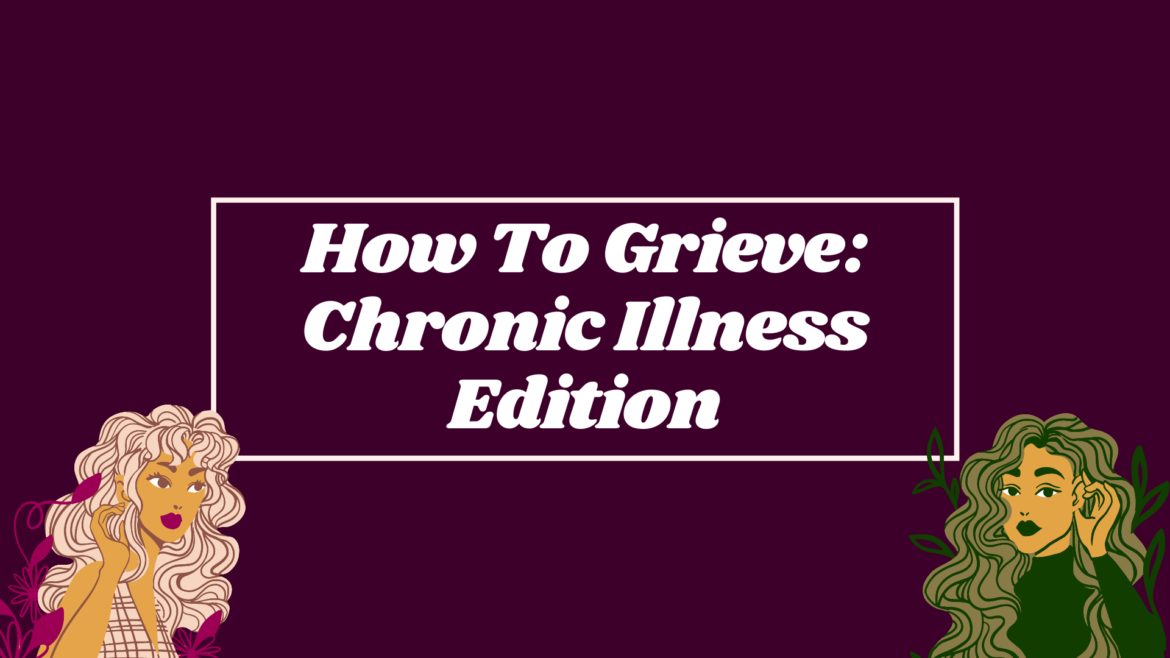Becoming chronically ill is a life-altering event. Even if there were signs and symptoms earlier in life, once that chronic illness reaches the point of heavily influencing your daily life, it feels like a completely different world. Suddenly, life is less about hobbies, seeing friends and family, and pursuing your career. It’s much more about managing symptoms, making doctor appointments, reading medical journals, calling insurance companies, and so much more. It’s difficult having to deal with these things on top of feeling symptoms like fatigue, pain, etc. constantly.
One major thing that can help is learning to grieve your past non chronically ill (or less chronically ill) self. Grief is a natural response to losing something or someone. In this case, you’ve lost who you were and who you thought that you would be. When we’re young, we’re rarely taught to plan for chronic illness even though it’s quite common. It’s difficult when our life plans are forced to change. However, grieving these changes helps to protect your mental health which is crucial.
The five stages of grief as explained by psychiatrist Elizabeth Kubler-Ross are known as denial, anger, bargaining, depression, and acceptance. How do they apply to chronic illness? The versions of these differ for every individual but let’s talk about some common versions of these stages.
Stage of Grief #1: Denial
It begins with denial. You may start by denying that you’re chronically ill. It must just be a bad cold or the flu that’s been bothering you for a bit too long. You question if maybe it’s stress, lack of sleep, dehydration, or your food that’s causing you to feel this way. It’s not like it can last forever, right? But then it doesn’t go away. You try to change up your life a bit and perhaps you feel a bit better, but you’re still not feeling great. You continue trying to figure this out.The home remedies don’t make it go away. The medicine you get from the doctor isn’t much help either. It starts to get frustrating which leads into the second stage of grief.
Stage of Grief #2: Anger
You’re starting to feel angry. Angry at your body for suddenly not working like it used to. Maybe you even exercised several days a week and ate a lot of fruits and vegetables, but now you still feel absolutely horrible! That feels so unfair. You’re now angry at the doctors who keep gaslighting you. You’re getting mad at the doctors who listen but don’t provide any answers either. You’re trying out different things. Some things can help but it can get so overwhelming. It gets extremely frustrating to have to deal with this on top of everything else going on in your life.
Stage of Grief #3: Bargaining
This stage showcases hope. You believe things can get better. You may start to bargain with the universe, religious figures, nature, your body, etc. If you just do x, y, and z, then you deserve to be healthy, so then you’ll be healthy, right? The fault in that argument is that you never deserved to get sick in the first place. Being chronically ill isn’t a reflection of your character in any way. Anyways, during the bargaining stage, you start to fantasize about how different your life can become in a better way. It feels like things can become so much easier soon.
Stage of Grief #4: Depression
When you have a moment of realization that the bargaining didn’t change anything and that the fantasy of your body functioning differently isn’t coming true, it’s common to feel depressed, especially when you don’t have a strong support system, both with family/friends and with your medical care team. You wonder about the worth of your life and may see yourself as a burden, but you’re not a burden. You’re just someone who functions a bit differently in this world due to your body. That doesn’t make you a burden. (You can check out an article about not being a burden here.)
Stage of Grief #5: Acceptance
At some point, you learn to accept your chronically ill body, your current situation, and the way it impacts your life. Acceptance comes step-by-step. When you allow yourself to feel anger, depression, and any other negative emotion in the grieving process, you’ve allowed yourself to figure out what exactly is making you feel certain ways so you’re more equipped to deal with those negative feelings when they emerge in the future. Yes, they’ll emerge in the future once again. A new symptom, a new diagnosis, a realization that you’re unable to do something that you really want to do (it may need to be grieved more or maybe this specific thing wasn’t grieved yet) can cause the process to start over once again. However, it’ll generally get easier over time. As time passes, you’ll learn to better manage your symptoms, figure out which meds/remedies work best for you, learn to rest more, and find better support over time which also helps the grieving process.
Everyone grieves differently in their own way and at their own pace. You don’t have to follow any specific path or formula. Whatever you feel is valid, no matter if it’s positive or negative. Try to be kind and patient with yourself throughout this difficult ongoing process. At the very least, remember that you’re never alone. There is an entire chronic illness community who understands having to grieve chronic illness. We have lost a lot, but at the very least we have gained a wonderful community.

